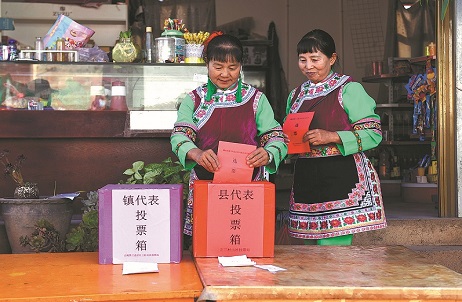-
Draft highlights people-centered democracy
November 02, 2022Whole-process people's democracy has been highlighted in a draft law amendment, so as to ensure public opinions are heard in every step of legislative affairs.
-

Experts laud merits of China's democracy
October 20, 2022Whole-process people's democracy is a system in which all key legislative decisions are made in accordance with procedures and through deliberations to make sure the decision-making system is sound and democratic, said Xi, general secretary of the Central Committee of the Communist Party of China.
-
Courtyard meetings offer glimpse into grassroots democracy
October 12, 2022The "courtyard meeting room" is a self-governance organization for local residents, which is largely composed of retirees who are keen on public affairs.
-
City's 'whole-process democracy' on display
July 21, 2022President Xi Jinping first advanced the concept during a visit to Changning's Hongqiao subdistrict in 2019. It's a system designed to ensure that all major legislative decisions are formulated democratically and generated through scientific, democratic decision-making.
-
Chinese people directly elect 2.6m lawmakers at township, county levels
June 30, 2022More than 2.6 million deputies to people's congresses at the township and county levels have been directly elected across China, a Chinese spokesperson said Wednesday.
-
Top legislature better at collecting public opinion
June 30, 2022The top legislature has established more channels for the public to participate in national governance over the past decade, guaranteeing that the people are the masters of the country, officials said.
-
Top legislator stresses NPC deputies’ role in whole-process people's democracy
May 18, 2022Li Zhanshu, a member of the Standing Committee of the Political Bureau of the Communist Party of China Central Committee and chairman of the National People's Congress (NPC) Standing Committee, held a symposium on April 18 with NPC deputies invited to sit in on the 34th session of the 13th NPC Standing Committee as non-voting participants.
-
Shanghai advances whole-process people's democracy
March 22, 2022Shanghai has been advocating a "three-meeting" system to reach decisions in residential neighborhoods, which serves as a grassroots example of whole-process people's democracy.
links
京ICP备13028878号-11



